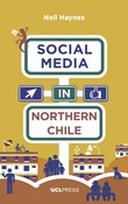Explore

Based on 15 months of ethnographic research in the city of Alto Hospicio in northern Chile, this book describes how the residents use social media, and the consequences of this use in their daily lives. Nell Haynes argues that social media is a place where Alto Hospicio’s residents – or Hospiceños – express their feelings of marginalisation that result from living in city far from the national capital, and with a notoriously low quality of life compared to other urban areas in Chile.
In actively distancing themselves from residents in cities such as Santiago, Hospiceños identify as marginalised citizens, and express a new kind of social norm. Yet Haynes finds that by contrasting their own lived experiences with those of people in metropolitan areas, Hospiceños are strengthening their own sense of community and the sense of normativity that shapes their daily lives. This exciting conclusion is illustrated by the range of social media posts about personal relationships, politics and national citizenship, particularly on Facebook.
This book is included in DOAB.
Why read this book? Have your say.
You must be logged in to comment.
Rights Information
Are you the author or publisher of this work? If so, you can claim it as yours by registering as an Unglue.it rights holder.Downloads
- 32 - pdf (None) at Google Books.
- 31 - pdf (None) at Google Books.
- 265 - pdf (CC BY-NC-ND) at OAPEN Library.
- 568 - pdf (CC BY-NC-ND) at Internet Archive.
Keywords
- cultural anthropology
- Alto Hospicio
- anthropology
- Chile
- Culture
- digital anthropology
- ethnography
- Iquique
- Meme
- Social & cultural anthropology, ethnography
- Social media
- Social Science / Anthropology
- Social Science / Anthropology / Cultural
- Society
- Society & Social Sciences
- society, culture
- Sociology
- Sociology & anthropology
- Sociology, general
- thema EDItEUR::J Society and Social Sciences
- thema EDItEUR::J Society and Social Sciences::JH Sociology and anthropology::JHM Anthropology::JHMC Social and cultural anthropology
Links
DOI: 10.14324/111.9781910634592Editions





